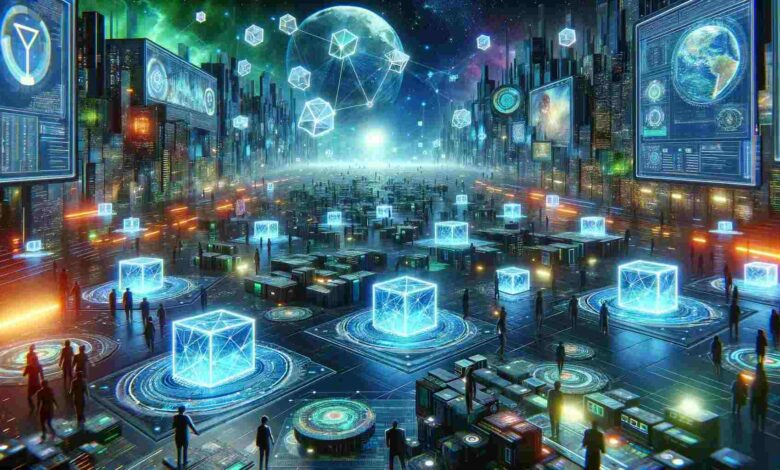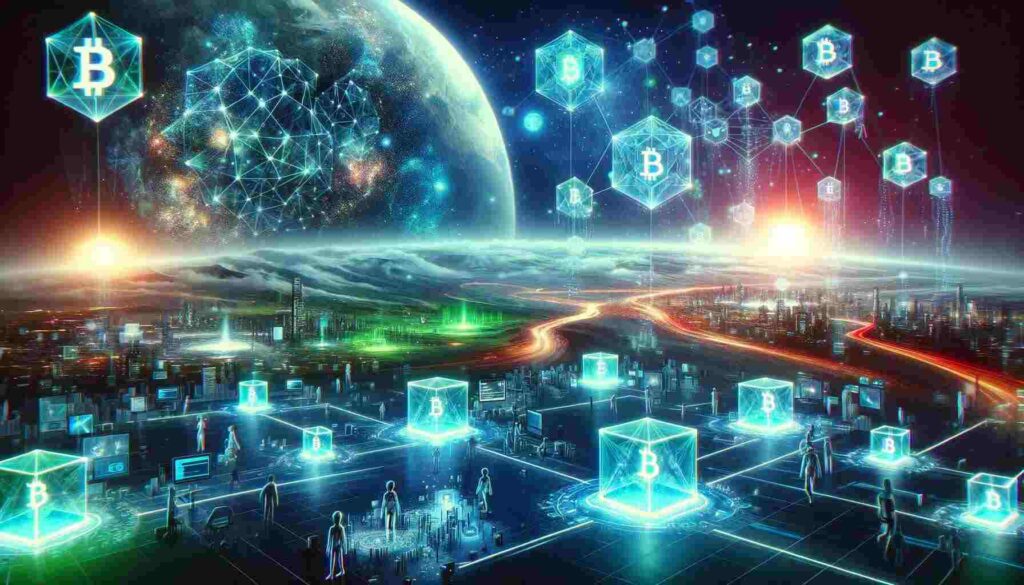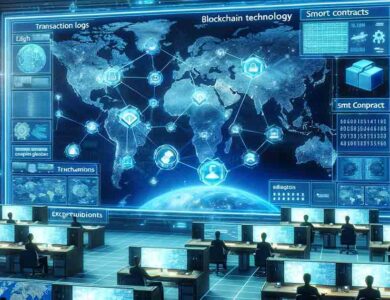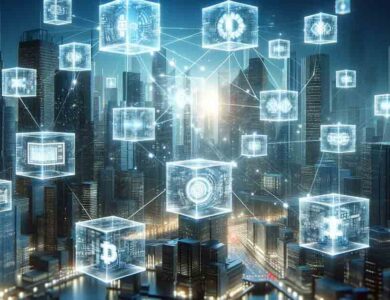What is blockchain integration in the metaverse?

Blockchain Integration in the metaverse in details
What is blockchain integration in the metaverse?
Introduction to Blockchain and Metaverse
The metaverse and blockchain coming together is a game changer in digital interaction as it meshes cutting-edge technology with attractive virtual worlds. With decentralization held up by a trusty and secure spine of the ledger blockchain. The birthplace manifests as an intricate virtual universe metaverse. In collaboration, they form a symbiotic bond, which in turn results in changing dynamics of our connection and the way we trade as well as networking one’s digital divinity.
Building the Metaverse with Blockchain.
Importantly, the introduction of blockchain to the metaverse is crucial based on its central principle of decentralization. This paradigm change provides unprecedented security and reliability to digital communications within the metaverse, secured by blockchain’s built-in immutable nature. These features serve as a foundation for developing a strong and stable virtual environment.
Cryptocurrencies: The Economic Layer of the Metaverse
The economy of the metaverse is based on cryptocurrencies. Which make it easy and secure to conduct transactions in this virtual world. From classic coins to metaverse-native tokens. They reform the virtual economy we have today with an advanced and sophisticated economic mechanism in the digital world.
NFTs: Unique Digital Ownership within the Metaverse
NFTs transform digital possession in the metaverse, incarnating individuality and ownership within it. These digital assets, ranging from art to virtual real estate, are illustrative of the marriage between creativity and technology. They contain a physical value and ownership in an otherwise intangible realm.

Smart Contracts: Automated Agreements in the Metaverse
Smart contracts automate and faithfully implement agreements in the metaverse without error or omission. These self-enforcing contracts provide a foundation for several applications within the virtual world, such as transactions. In addition to automated governance, indicating that blockchain technology is flexible and effective.
Blockchain and Identity Verification
In the metaverse, identity becomes more complex and demands stringent authentication methods. In this regard, blockchain takes a leading role in digital identity verification to promote privacy and safety while offering ease of virtual living.
Metaverse DeFi
DeFi introduces a unique financial services framework into the metaverse, circumventing age-old banking standards. This financial environment is characterized by decentralized services ranging from the issuance of loans to asset management. Making a significant shift concerning how virtual transactions are conducted.
Governance and Community Participation
Decentralized governance frameworks will govern the metaverse, whereby decisions are also made through community participation. This participative process creates a feeling of ownership and democratic participation. Creating the evolution process of the virtual world as a collaboratively built landscape.
DAOs in the Metaverse
Decentralized Autonomous Organizations (DAOs) are yet another organizational aspect in the metaverse, Jovian stated. Which is demarcated by blockchain technology and group decision-making. These organizations help to forge a much-needed ecosystem of the metaverse and thus further prove that decentralized governance can not only work on a practical level but is also quite effective.
Interoperability and Standardization
Nevertheless, the problem of interoperability has remained an important challenge for the metaverse, which requires intensive activities towards standardization. Uninterrupted interoperability between various virtual spaces and blockchain platforms is a necessary component of the integrated development metaverse ecosystem.
Environmental Impact and Sustainability
The aspect of environmental footprint that concerns blockchain, especially on energy consumption, is large. Overcoming these sustainability issues is vital, and constant innovations in minimizing the ecological footprint from blockchain operations in the metaverse are needed.
Real Estate and Asset Tokenization
Tokenization within the metaverse opens a new paradigm in property, especially virtual real estate ownership and transfer. This blockchain-based process streamlines the transactions, but wading through maze-like legalities and regulations presents its own difficulties.
Blockchain in Metaverse Education and Training
Metaverse opens new ways for education and training, with blockchain being crucial in the issuance of credentials. Different programmes show the power of this integration by transformation, providing advanced and immersive educational experiences.
Metaverse and Blockchain in Healthcare
Potential applications of blockchain in healthcare within the metaverse include safe patient records management and treatment simulations. Nevertheless, ethical and privacy issues continue to be a significant factor in traversing this developing space.
Blockchain and The Future of Work
The metaverse is a virtual representation powered by blockchain technology, changing the future of work and enabling remote working. It also leads to new employment models. This transformation aids in building new work models and spaces, outlining how blockchain is safe and effective.
Challenges in Blockchain Integration
There are certain considerations that can be brought about by the adoption of blockchain into the metaverse. Such as technical challenges, case uncertainties in regulation and user acceptance. The resolution of these challenges is necessary to secure a successful integration between these two revolutionary technologies.
Security and Fraud Prevention
Fraud and cyber threats are some of the key security issues for users in the metaverse promoted by blockchain technology. This is because having reliable security measures ensures the provision of a safe and stable virtual environment.
Conclusion
Basically, the adoption of blockchain technology into the metaverse is a revolution in virtual contact and online experience. Being a fundamental pillar, blockchain adds better security and decentralization as well as innovative economic models via cryptocurrency currency NFTs DeFi in the metaverse ecosystem. Application as a means of identity authentication, asset tokenization and governance, especially through the DAOs, is evident. Still, some common problems, such as interoperability and environmental sustainability, along with regulatory complexities, require specialized answers. Despite these difficulties, the merger of blockchain and metaverse remains a source of large-scale investments that point to its bright future. In this context, the prospects of a few changes are within different spheres. Including the gaming industry, real estate business development and even education or health care. These perspectives open vice to changing our digital interaction methods that allow virtual collaboration and innovation.
FAQs What is blockchain integration in the metaverse
Why is blockchain important in the metaverse?
The metaverse operates with a secure decentralized building, the blockchain that gives enough trust to this virtual space and enables quicker transactions accompanied by high-security levels.
What are the roles of cryptocurrencies and NFTs in the metaverse?
The operational system of the metaverse economy is centred on cryptocurrencies, while NFTs regulate sole ownership of digital art and virtual real estate.
How are smart contracts involved in the metaverse?
Smart contracts are the ones that automate and enforce agreements in the metaverse, which forms a base for several applications. Such as transactions or even self-governing entities, with higher precision and reliability.
How can blockchain technology be integrated into the metaverse?
Some of the major issues that affect virtual reality are technical complexities, interoperability between different virtual spaces and environmental sustainability challenges. Regulatory uncertainties, and user adoption bottlenecks.
What effect does blockchain have on gaming and real estate industries in the metaverse?
In gaming, blockchain enhances gameplay and introduces new ownership and monetization models. In real estate, blockchain enables asset tokenization, simplifying transactions and potentially navigating complex legal landscapes.



